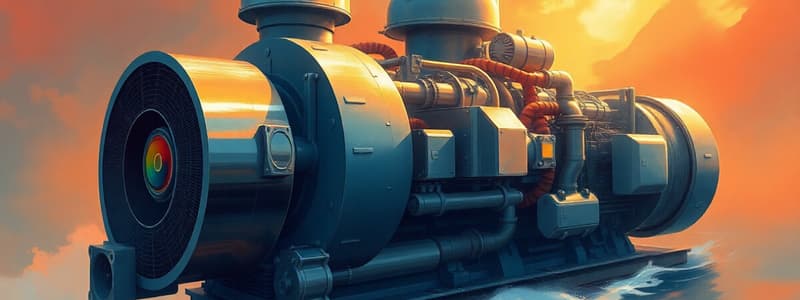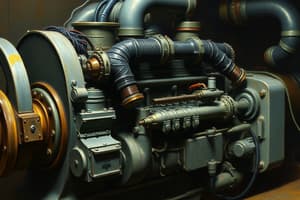Podcast
Questions and Answers
What is the primary function of electronic control units (ECUs) in marine engines?
What is the primary function of electronic control units (ECUs) in marine engines?
- To filter impurities from the fuel
- To manage exhaust aftertreatment systems
- To physically power the engine
- To monitor and regulate engine functions (correct)
Which component is responsible for removing impurities from fuel?
Which component is responsible for removing impurities from fuel?
- Fuel injectors
- Fuel filters (correct)
- Fuel tanks
- Fuel pumps
Why are regular maintenance schedules important for marine engines?
Why are regular maintenance schedules important for marine engines?
- To minimize personnel training requirements
- To optimize performance and longevity (correct)
- To ensure compliance with environmental regulations
- To enhance fuel efficiency only
What role do sensors play in engine management systems?
What role do sensors play in engine management systems?
Which safety measure is essential in the event of a malfunction in marine engines?
Which safety measure is essential in the event of a malfunction in marine engines?
What is one of the main purposes of exhaust aftertreatment systems?
What is one of the main purposes of exhaust aftertreatment systems?
What advantage do high-performance materials provide in marine engine components?
What advantage do high-performance materials provide in marine engine components?
Which factor contributes to minimizing unplanned downtime in marine engines?
Which factor contributes to minimizing unplanned downtime in marine engines?
What is the primary function of marine diesel engines?
What is the primary function of marine diesel engines?
Which type of marine diesel engine has a simpler design with fewer moving parts?
Which type of marine diesel engine has a simpler design with fewer moving parts?
In which application are large-bore marine diesel engines ideal?
In which application are large-bore marine diesel engines ideal?
What is the role of the crankshaft in a marine diesel engine?
What is the role of the crankshaft in a marine diesel engine?
Which type of marine diesel engine is most efficient and produces the least exhaust emissions?
Which type of marine diesel engine is most efficient and produces the least exhaust emissions?
What does the fuel injection system do in a marine diesel engine?
What does the fuel injection system do in a marine diesel engine?
What kind of gas exchange occurs in four-stroke marine diesel engines?
What kind of gas exchange occurs in four-stroke marine diesel engines?
What is the function of the cooling system in a marine diesel engine?
What is the function of the cooling system in a marine diesel engine?
Flashcards
What is the role of marine diesel engines?
What is the role of marine diesel engines?
Marine diesel engines are critical for powering ships of all sizes, using the chemical energy in diesel fuel to generate mechanical power for propulsion.
What are two-stroke engines?
What are two-stroke engines?
These engines have a simplified design, completing a power cycle in just two piston strokes. However, they might produce more exhaust emissions than their four-stroke counterparts.
What are four-stroke engines?
What are four-stroke engines?
They are more complex, taking four piston strokes for each power cycle. However, they offer better fuel efficiency and produce less emissions.
What are large-bore engines?
What are large-bore engines?
Signup and view all the flashcards
What are medium-speed engines?
What are medium-speed engines?
Signup and view all the flashcards
What are high-speed engines?
What are high-speed engines?
Signup and view all the flashcards
What is the cylinder block?
What is the cylinder block?
Signup and view all the flashcards
What is the fuel injection system?
What is the fuel injection system?
Signup and view all the flashcards
Cycle Repetition
Cycle Repetition
Signup and view all the flashcards
Exhaust
Exhaust
Signup and view all the flashcards
Control Systems
Control Systems
Signup and view all the flashcards
Electronic Control Units (ECUs)
Electronic Control Units (ECUs)
Signup and view all the flashcards
Sensors
Sensors
Signup and view all the flashcards
Engine Monitoring and Fault Diagnostics
Engine Monitoring and Fault Diagnostics
Signup and view all the flashcards
Safety Systems
Safety Systems
Signup and view all the flashcards
Diesel Fuel Tanks
Diesel Fuel Tanks
Signup and view all the flashcards
Study Notes
Introduction to Marine Diesel Engineering
- Marine diesel engines power ships, from small fishing vessels to large container ships.
- Engines convert diesel fuel's chemical energy into mechanical energy for propulsion.
- Engine types vary according to vessel size and application.
- Efficiency and reliability are key design considerations.
Types of Marine Diesel Engines
- Two-stroke engines: Simpler design with fewer parts, complete a power cycle in two piston strokes; higher exhaust emissions than four-stroke.
- Four-stroke engines: More complex design, four piston strokes per power cycle, generally more fuel-efficient with lower exhaust emissions.
- Large-bore engines: Designed for slower, heavy-duty applications (like cargo ships), with larger piston diameters, similar component configurations to smaller engines but often with differing scaling.
- Medium-speed engines: Balance of power, speed, and efficiency, commonly used on ferries and cruise ships.
- High-speed engines: Optimized for speed, used on smaller vessels and diverse applications.
Components of a Marine Diesel Engine
- Cylinder block: Houses cylinders and provides structural support.
- Pistons and connecting rods: Convert expanding gas pressure into rotary motion.
- Crankshaft: Transforms reciprocating piston motion into continuous rotational motion.
- Valves (in four-stroke engines): Control intake and exhaust gases.
- Fuel injection system: Doses and atomizes fuel for efficient combustion.
- Cooling system: Maintains optimal engine temperature.
- Lubrication system: Reduces friction and wear on moving parts.
- Exhaust system: Removes exhaust gases.
Operational Principles
- Combustion: Fuel and air mix and ignite inside cylinders, producing force.
- Power Stroke: Expanding gases push pistons to generate rotational force.
- Cycle Repetition: Continuous process to convert chemical energy to vessel thrust.
- Exhaust: Waste gases are expelled.
Engine Management and Control Systems
- Control systems: Manage engine functions (speed, fuel, temperature).
- Electronic control units (ECUs): Monitor, regulate, and optimize engine performance.
- Sensors: Measure parameters like pressure, temperature, and speed for accurate control.
- Engine monitoring and fault diagnostics: Track performance, identify abnormalities, and improve maintenance.
- Safety systems: Ensure engine safety during operation and maintenance.
Fuel Systems
- Diesel fuel tanks: Store fuel for operation, varying in size based on vessel size and type.
- Fuel pumps: Supply fuel to injectors.
- Fuel filters: Remove impurities from fuel to protect engine components.
- Fuel injectors (or nozzles): Deliver fuel to cylinders in precise quantities.
Emissions & Environmental Considerations
- Exhaust aftertreatment systems: Reduce NOx and particulate matter emissions.
- Alternative fuels: Explore biofuels and other alternatives to reduce environmental impact.
- Regulations: Growing international regulations governing marine emissions.
- Emission monitoring systems: Essential for compliance with regulations and to prevent penalties.
Maintenance & Repair
- Regular maintenance schedules: Essential for optimal performance and engine longevity.
- Preventive maintenance: Reduces unplanned downtime and maintains engine integrity.
- Fault diagnosis and troubleshooting: Identify and resolve problems.
- Calibration and adjustments: Ensure precise operation and control.
- Specialized tools and equipment: Necessary for repair and maintenance.
Safety Considerations
- Engine room safety procedures: Prevent accidents during operation and maintenance.
- Emergency shutdown systems: Provide protection against malfunctions and emergencies.
- Personnel training: Equip crew with skills and knowledge for handling marine engines safely.
Advanced Technologies
- Digitalization: Employ digital tools for engine control, monitoring, remote diagnostics, and predictive maintenance.
- High-performance materials: Enhance durability and reduce wear of components.
- Modern engine designs: Incorporate innovative methods, such as variable geometry designs.
Studying That Suits You
Use AI to generate personalized quizzes and flashcards to suit your learning preferences.




